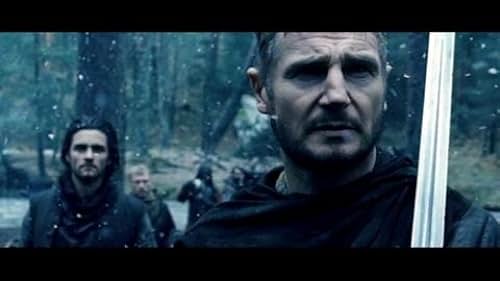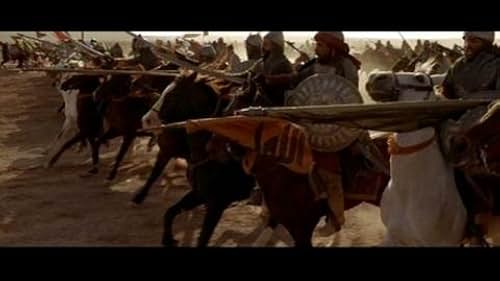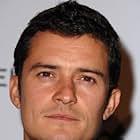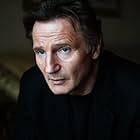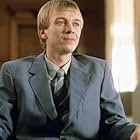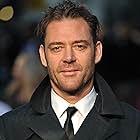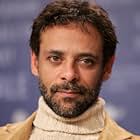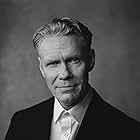Baliano di Ibelin viaggia alla volta di Gerusalemme durante le crociate del dodicesimo secolo ed è lì che si scopre difensore della città e dei rispettivi abitanti.Baliano di Ibelin viaggia alla volta di Gerusalemme durante le crociate del dodicesimo secolo ed è lì che si scopre difensore della città e dei rispettivi abitanti.Baliano di Ibelin viaggia alla volta di Gerusalemme durante le crociate del dodicesimo secolo ed è lì che si scopre difensore della città e dei rispettivi abitanti.
- Regia
- Sceneggiatura
- Star
- Premi
- 5 vittorie e 15 candidature
Trama
Lo sapevi?
- QuizSir Ridley Scott disowned the theatrical cut. He claims that the Director's Cut is the definitive version.
- BlooperThroughout the siege of Jerusalem, when the defenders use projectile weapons such as bows, trebuchets, crossbows, etc., the command given to release the projectile is "Fire!". This command did not come into use until the advent of matchlock firearms in the mid-15th century. The correct command would have been "Loose!".
- Citazioni
King Baldwin IV: Come forward. I am glad to meet Godfrey's son. He was one of my greatest teachers. He was there when, playing with the other boys, my arm was cut. It was he, not my father's physicians, who noticed that I felt no pain. He wept when he gave my father the news... that I am a leper. The Saracens say that this disease is God's vengence against the vanity of our kingdom. As wretched as I am, these Arabs believe that the chastisement that awaits me in hell is far more severe and lasting. If that's true, I call it unfair. Come. Sit.
[they sit down on opposite sides of a chessboard]
King Baldwin IV: Do you play?
Balian of Ibelin: No.
King Baldwin IV: The whole world is in chess. Any move can be the death of you. Do anything except remain where you started, and you can't be sure of your end. Were you sure of your end once?
Balian of Ibelin: I was.
King Baldwin IV: What was it?
Balian of Ibelin: To be buried a hundred yards from where I was born.
King Baldwin IV: And now?
Balian of Ibelin: Now I sit in Jerusalem, and look upon a king.
King Baldwin IV: [Baldwin chuckles] When I was sixteen, I won a great victory. I felt in that moment I would live to be a hundred. Now I know I shall not see thirty. None of us know our end, really, or what hand will guide us there. A king may move a man, a father may claim a son, but that man can also move himself, and only then does that man truly begin his own game. Remember that howsoever you are played or by whom, your soul is in your keeping alone, even though those who presume to play you be kings or men of power. When you stand before God, you cannot say, "But I was told by others to do thus," or that virtue was not convenient at the time. This will not suffice. Remember that.
Balian of Ibelin: I will.
- Curiosità sui creditiThe opening 20th Century Fox logo has a ocher-yellow tint added to it.
- Versioni alternativeThe 194 minute Director's Cut is a roadshow format presentation with an Overture, Intermission and Entr'acte. In all, 45 minutes of new scenes have been added, with the biggest addition, as Ridley Scott acknowledges in the introduction, being the subplot of Sibylla's son. Also, there is now more graphic violence in all the battle scenes, with newly added shots of spurting blood and new close-ups of wounds being inflicted. The primary additional scenes in the Director's Cut are:
- In the opening scene, there is a shot of the Priest (Michael Sheen) splitting open his apple only to find that it is rotten. Also, newly added dialogue with the gravedigger (Martin Hancock) reveals that the woman being buried was married to the Priest's brother, Balian the Blacksmith (Orlando Bloom).
- There is a new scene where the bishop of the town (Bill Paterson) orders Balian's brother to release Balian from prison so the blacksmith can aid him in completing the construction of the new abbey.
- There is a new scene of Balian looking at the sapling planted by his wife (Nathalie Cox), coupled with a flashback of her planting it. The guard of the prison (Tim Barlow ) then comes in to Balian's cell and releases Balian.
- There are several newly added shots of the French village as Balian walks away from the prison. These shots help to establish the local geography more clearly than in the theatrical version.
- After Godfrey (Liam Neeson) and his men arrive, there is a new scene of them having dinner with Godfrey's elder brother (Robert Pugh). While Godfrey is away from the table, the elder brother and his son (Nikolaj Coster-Waldau) conspire to kill Godfrey and take the mantle of Baron of Ibelin for themselves, which creates an additional reason for the forest ambush later in the film (in the theatrical cut, the ambush seems based purely upon an attempt to arrest Balian).
- A new scene shows Balian being verbally abused by his brother whilst sitting at the crossroads looking at his wife's grave.
- The following day, the Priest gives the Crusaders some background information on Balian, including his role as an engineer and how he used to build towers that could fling "the largest stones." Additionally, Odo (Jouko Ahola) asks Balian if he has ever seen warfare, to which Balian responds that he has, both on horse and on foot.
- Immediately after Odo's conversation with Balian, there is a brief flashback of Godfrey saying goodbye to Balian's mother before he left for Jerusalem. The subsequent exchange between Godfrey and the Hospitaler (David Thewlis) has been shortened in the Director's Cut, as some of the exposition given in that scene in the theatrical version has already been revealed in other newly added scenes, and their conversation is now much more oblique.
- Godfrey's line "I am your father" in the theatrical cut is substituted with "I knew your namesake" in the Director's Cut.
- After Godfrey and his men leave for Messina, there are a few additional shots of Balian's assistant (Bronson Webb) watching them leave and then looking back at Balian.
- Later that night, the scene where Balian kills his brother is longer, with much more dialogue and additional taunting from the Priest prior to Balian's attack.
- Several additional shots of Godfrey's men at camp have been added; the Hospitaler brushing his teeth; Firuz (Eriq Ebouaney) shouting at one of the men for urinating upstream of the camp; the English Sergeant (Kevin McKidd) greasing Godfrey's armor (this explains why Godfrey is hurt so badly by the arrow in the subsequent ambush - he is not wearing his chain-mail).
- The ambush scene has several new additions. Roger's son greets Godfrey as "Uncle" and mentions his father (Godfrey's brother); as Roger's son leaves he says "You are my uncle, I must give you the road" as opposed to the theatrical "You are a knight, I must give you the road"; a new close-up of the horse crossing the river with the Hospitaler hiding by hanging off the left flank; a new shot of Godfrey chasing Roger's son, and saying "Thank my brother for his love"; a new execution scene where the son of Roger de Cormier (Paul Brightwell) is stabbed in the back of the head by the English Sergeant after he demands the right to be held to ransom. The ambush is also considerably bloodier than in the theatrical cut.
- On the pilgrim's road, the acolyte (Steven Robertson) now says "To kill an infidel, the Pope has said, is not murder. It is the path to heaven." In the theatrical cut, he said "To kill an infidel is not murder. It is the path to heaven." There is also a brief new scene of the Hospitaler speaking to an old pilgrim (Peter Copley) who is leading a group of children to Jerusalem. Additionally, there are a few more shots of Godfrey's tent prior to the arrival of Guy de Lusignan (Marton Csokas).
- At Messina, the English Sergeant gives Balian some background information about local trade and why the port is so busy.
- The morning after Balian has met Almaric (Velibor Topic) in Jerusalem, there is a new scene in Balian's house. After waking up, Balian has a bath, but is embarrassed at having to get out of it naked in front of the servant girls. When he does finally get out, he is extremely uncomfortable in allowing them to dry him, so he grabs the towel and walks off, much to their amusement.
- Also at Balian's house, there is a new scene where the Hospitaler discusses faith, remarking that he doesn't put much stock in religion anymore because he has seen too many fanatics use religion as an excuse for killing.
- When the Hospitaler brings Balian to see Tiberias (Jeremy Irons), the title card 'Office of The Marshal of Jerusalem' appears later, closer to the actual introduction of Tiberias himself.
- After Tiberias has told Raynald de Chatillon (Brendan Gleeson) that one day, his title will no longer protect him, there is a short new scene where the witness (Nasser Memarzia) to Raynald's attack on the caravan complains to Tiberias about Raynald walking free, and Tiberias pays him off to keep quiet.
- The scene where Balian meets Baldwin IV (Edward Norton) is longer, with several new lines of dialogue scattered throughout. Additionally, there is a new section of the scene where Balian gives the King advice on how best to protect the city from a massive attack.
- After speaking with Baldwin, as Balian leaves, he stumbles over a small toy soldier. As he scoops down to pick it up, he sees Sibylla's son (Potts, Alexander) - although we don't know who he is yet. Balian smiles at the boy and puts the toy back down. After Balian has gone, the boy comes and gets the toy.
- The close-up of Balian as he looks at the tableaux on the wall in his father's house at Ibelin has been extended, and there are a number of shots which serve to lay out the geography of the house in more detail than in the theatrical cut.
- As Balian and Almaric survey the land at Ibelin, Almaric has a line not in the theatrical version; "My lord, this is a poor and dusty place." This pays off just prior to the beginning of the Siege of Jerusalem, where Balian tells Almaric that if he survives, he can have Ibelin, to which Almaric replies, "But my lord, it is a poor and dusty place," and they smile at one another.
- There is a new scene between Balian and Sibylla (Eva Green) where she washes his face after he comes in from working on the land, and she tells him that she is free to do as she pleases due to her being the King's sister.
- The scene between Balian and Sibylla as Balian watches the Muslim servants performing their prayers has some additional dialogue where she tells him about her son.
- There is a new scene with Balian where he is walking by the irrigation system and sees the toy boat that the boy used earlier when the water pumps were first set up. He picks the boat up and looks at it for a moment, before returning it to the water and watching it float away.
- After the battle of Kerak, as the army leaves, Guy looks at Balian and then at Sibylla and notices them looking at one another; the implication being that he knows Balian and Sibylla have been together.
- After the Mullah (Khaled Nabawy) leaves Saladin's (Ghassan Massoud) tent, there is a short new scene between Saladin and Imad (Alexander Siddig) where they discuss what is likely to happen when Baldwin IV dies.
- As the Saracen doctors enter Baldwin's chamber, there is a newly added scene of Guy practicing with his sword in the hallway.
- Immediately after this, there is a new scene of Raynald walking around in circles in his cell repeatedly shouting out his name. The jail-keeper is trying to have his dinner and looses patience, slamming the inner door of the prison shut.
- Following this, there is a new scene showing Baldwin IV refusing the last sacrament from Patriarch Eraclius (Jon Finch). Eraclius leaves the chamber in disgust and meets Guy outside.
- After the departure of Eraclius, there is another new scene in which Guy (rather unceremoniously) seduces Sibylla's maid (Samira Draa).
- There is then a new scene between Balian and Sibylla where Sibylla points out that, as Regent, she is going to have to run the Kingdom until her son is ready to do it himself. Balian asks what role Guy will have in this new government, but Sibylla doesn't answer him.
- After leaving Balian, Sibylla arrives at the palace in the early morning. Once inside, she sees Guy with her son, followed by a scene in which Guy attempts to force her to accept his knights' allegiance, threatening that if she does not, her son's reign as King will be "brief and bloody."
- The scene where Guy brings Raynald some food is slightly longer; Raynald now makes Guy eat some of the food before he eats any himself.
- There is a new scene of Sibylla teaching her son about England and France. Tiberias arrives and tells her that if she wants to say goodbye to her brother, she had better do it now. At first, she is reluctant, but Tiberias persuades her to go. After she and Tiberias leave, the boy places his palm on top of the fire lamp and feels no pain, despite blistering his flesh - thus indicating that he, like his uncle Baldwin IV, has leprosy.
- Baldwin IV's death scene is slightly longer than in the theatrical cut, with some additional moments of silence between him and Sibylla.
- When Guy confronts Sibylla after Baldwin's death, an additional line of dialogue has been added; "If my son has your knights, you have your wife."
- The scene where Sibylla visits Baldwin's body is slightly longer. In this version, after she removes the mask to look at his face, she then gently places the mask back on, and tucks it in under his hood.
- There is a new scene showing Baldwin V's coronation.
- Immediately after the coronation, an interesting new scene between Balian and the Hospitaler has been added. Balian is throwing a stone at a bush, trying to get a spark so as to make the bush ignite. As the Hospitaler arrives, Balian succeeds, and suggests this is proof God doesn't exist. The Hospitaler disagrees. They talk briefly, and as the Hospitaler rides away, a bush several feet away from the burning one suddenly ignites in flames without any apparent cause. Balian turns around in amazement, and then turns back to the Hospitaler, but he is gone; the plains are deserted for miles around. As Balian looks around, his horse seems to jump in fright.
- A series of new scenes follow the bush scene. We see the new King signing various documents, and there is a close-up of some wax dropping onto his hand without him feeling anything. Eraclius and Sibylla both see this, and realize that something is wrong. There is then a short scene of a physician pricking the boy's feet with pins, without him feeling anything, and Sibylla beginning to cry. Next, Tiberias tells Sibylla that rumors are spreading that the boy is ill, and that he needs to be seen publicly to dispel such gossip. Sibylla breaks down and Tiberius comforts her. Finally, there is a scene between Sibylla and her son in the palm orchard, where she pours poison into his ear so as to euthanize him, whilst singing him to sleep.
- The scene where Guy comes to let Raynald out of jail is slightly different. There is some additional dialogue at the start of the scene where Raynald inquires as to whether Baldwin V is dead. Raynald then asks if Guy has had Balian killed. However, in the theatrical cut he asked, "Have the Templars removed your problem?", whereas in the Director's Cut he asks, "Have the Templars killed Balian?"
- Another interesting new addition involving the Hospitaler occurs after Guy has been crowned King-Consort. Balian is lying on the ground after the attack by Guy's assassins, unconscious (or possibly dead; blood is coming from one of his ears), and the Hospitaler walks over to him and touches him on the cheek with his finger.
- As well as stabbing Saladin's messenger (Karim Saleh) in the throat, Guy now also decapitates him.
- After Guy's army leaves for war with Saladin, additional lines have been added into the exchange between Tiberias and Balian regarding Baldwin V's death and how Jerusalem has lost all hope of peace.
- Saladin now decapitates Raynald as well as cutting his throat (there is also more blood when his throat is slit).
- As he knights the men in Jerusalem, there is a new scene where Balian meets the gravedigger from the opening scene of the film and exchanges a few words with him.
- During the siege, there is a new scene in the infirmary where Sibylla is tending to the gravedigger. They exchange some dialogue, and the gravedigger reveals that he knows she is the Queen. He then smiles kindly at her and leaves.
- The scene where Balian wakes up the morning after the final battle is longer. Instead of waking and then immediately standing up, he wakes and looks around, seeing the body of the gravedigger nearby. He looks at the body and says, "Remember me in France, Master Gravedigger." He then stands up.
- During the negotiation of terms between Balian and Saladin, an additional line has been added, said by Saladin: "As for your king, such as he is, I leave up to you." There is a brief shot of Guy at this point.
- A new scene has been added after Balian has surrendered Jerusalem, but before the Christians have left the city. Balian is washing his face in an alleyway, and is approached by Guy, who challenges him to a sword fight. Balian wins, sparing Guy's life and simply walking away.
- When Balian arrives back in France, he sees the tree planted by his wife is now beginning to bloom.
- ConnessioniEdited from L'Albatross - Oltre la tempesta (1996)
- Colonne sonoreLe Roi Renaud De Guerre Revint
Traditional
Clearly, director Ridley Scott does not agree with the above somewhat simplified philosophy expressed by Shaw through his character Don Juan. In "Kingdom of Heaven", wars and battles are fuelled by an assortment of motivations including land, money, political consideration, natural desire for violence, lust for fame, love of the common people, among others. Even more importantly, this "idea" thing does not prevent leaders from practicing tolerance, reaching compromises and even recognizing equality with alien faiths, as the movie tries to show us.
Recognizing that this movie is a mix of historical fact and dramatized fiction, let me focus on one rather unusual aspect of the hero Balian (Orlando Bloom), a blacksmith inheriting knighthood and an estate from a father appearing out of the blues. As Balian takes over the barren desert estate after the untimely death of the recently-discovered father, he does something that the father apparently has failed to do in all these years dig into the earth to find a reliable source of water and proceed to make the estate productive. Later, the resilient defence of Jerusalem owes just as much to Balian's knowledge of practical laws of mechanics as to his military skills. In the end, he turns away from the inherited knighthood and goes back to be a blacksmith, taking with him a queen. Triumph of the working class, as my summary line suggests.
Depiction of the arch adversary Saladin follows very much the line taken in the novels of Sir Walter Scott (another Scott here!), particularly "The Talisman", as someone mysterious (to the extent of being almost omnipresent - in the novel) but wise and benevolent, a breed of political leader that is sadly in short supply today. The hero Balian, as mentioned, has little interest in divinity and every interest in the welfare of the people. These two leaders, put in today's context, could qualify "Kingdom of Heaven" for a fairy tale.
It's difficult to refrain from comparing the attack of Jerusalem with the attack of Minas Tirith, and this very comparison can be construed as an unreserved compliment on Kingdom of Heaven. Another comparison that can be made is the depiction of a mighty army, done so unimaginatively in two similar movies last year. In Kingdom of Heaven, we see first a solitary figure on horseback at a distant mountain gap. "Saladin's army of 200 thousand is here" says Balian. "There's only one person", comes the reply from a follower. "No, they're all here" Balian quietly responses, at which point the angle of the camera starts to rise, first revealing the patch behind the mountain gap, filled with soldiers. Then, as the horizon of our vision continues to extend, layers of mountains and vales continue to appear, together with Saladin's mighty army deployed in an apparently haphazard, but ultimately strategic fashion. This must be seen to appreciate.
Of the cast, I must first mention Edward Norton. As the leper king of Jerusalem, he appears all the time behind a mask which covers his entire face, showing only his eyes with disfigured corners. But it's the voice that is so mesmerizing. Ever since Fight Club, Norton's voice has such a timbre that soft as he sounds, there are lurking behind tantalizing hints of subtlety, intrigue, compassion, power, and twenty other different and conflicting emotions all at once.
Bloom grows into his role, starting rather expressionless (which may not be totally unreasonable considering that the character has just lost a wife and a child) but gradually gaining in confidence. Liam Neeson and Jeremy Irons, playing father and mentor respectively, do not exactly have the most challenging parts in their careers. Eva Green retains the girlish defiance in The Dreamer, but adds to it the maturity and allure required for the role of Sibylla (as portrayed by the script, but not necessarily as recorded in history). And there is good old Brendan Gleeson, in the customary role of big bully fighter which he has perfected in Gangs of New York and Troy.
Kingdom of Heaven is one cut above Troy and Alexander last year.
- harry_tk_yung
- 5 mag 2005
- Permalink
I più visti
Everything New on Prime Video in November
Everything New on Prime Video in November
Dettagli
- Data di uscita
- Paesi di origine
- Lingue
- Celebre anche come
- Cruzada
- Luoghi delle riprese
- Aziende produttrici
- Vedi altri crediti dell’azienda su IMDbPro
Botteghino
- Budget
- 130.000.000 USD (previsto)
- Lordo Stati Uniti e Canada
- 47.398.413 USD
- Fine settimana di apertura Stati Uniti e Canada
- 19.635.996 USD
- 8 mag 2005
- Lordo in tutto il mondo
- 218.237.071 USD
- Tempo di esecuzione2 ore 24 minuti
- Colore
- Proporzioni
- 2.39 : 1


